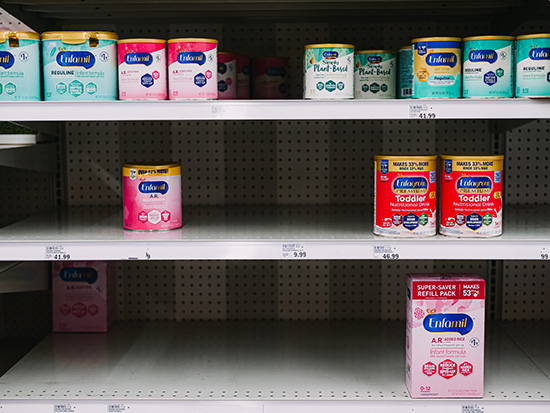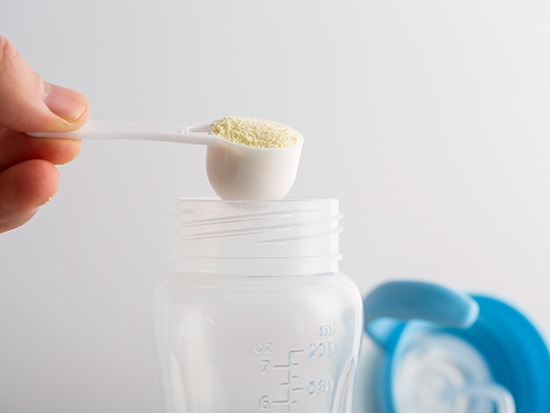
In the years following the COVID-19 pandemic, supply chain disruptions have caused a wide range of products to be low on the shelves, hard to come by or unable to be shipped for months. While many of these products have not impacted a person’s health and well-being, one of 2022’s most pressing shortages has sent parents panicking: baby formula.
Caused in part by voluntary recalls and significant supply chain issues, baby formula shortages are leaving store shelves bare, with parents’ turning to social media groups to barter and trade for nutrition for their children. What should parents know about these shortages, how do they properly feed their child, and what should they do if they cannot find their specific formula? Carlie Stein Somerville, M.D., assistant professor in the University of Alabama at Birmingham Departments of General Internal Medicine and Pediatrics, shares advice and assurance with parents who find themselves in a challenging predicament during prolonged baby formula shortages.
If a parent cannot find the formula that they have been feeding their baby, can they switch between lines within the brand? For instance, from gentle to normal lines?
Fed is best. Unless your infant or child has specific formula requirements to an underlying milk protein allergy or other complex medical condition requiring specific amino acid-based formula, it is OK to transition between formulas to ensure nutrition is maintained. This includes use of formulas developed specifically for infants with reflux or higher-calorie formulas for premature infants. It is OK to give these formulas to feed full-term babies if other formulas are not available.
The American Academy of Pediatrics strongly recommends against parents’ trying to make their own formula. What harms could happen if a child were to ingest homemade formula?
The American Academy of Pediatrics recommends against making your own formula due to concerns that they will not meet an infant’s nutritional needs and will cause significant risk of hospitalization or death. Infants have specific nutrient and electrolyte needs to promote healthy growth and development, which properly and safely approved developed formula provides.
Some parents are turning to diluting formula to stretch formula longer. Why is this a bad thing to do?
 Please do not dilute formula. Formula mixing is done very specifically to ensure that infants get the correct proportion of nutrients and water. Too much water — especially in infants under 6 months of age — can be very dangerous and lead to electrolyte imbalances and more severe complications including seizures and hospitalization. Always follow instructions for mixing as labeled by the manufacturer.
Please do not dilute formula. Formula mixing is done very specifically to ensure that infants get the correct proportion of nutrients and water. Too much water — especially in infants under 6 months of age — can be very dangerous and lead to electrolyte imbalances and more severe complications including seizures and hospitalization. Always follow instructions for mixing as labeled by the manufacturer.
The AAP has recently stated that it is safe to give babies older than 6 months cow’s milk in the absence of formula at this time. What should parents know about this new update?
The AAP offers this alternative for infants over 6 months if there are truly no other options available, and to be used only on a short-term basis. Prolonged use of cow’s milk in this age group is not ideal because it can be difficult to digest and it does not contain the same necessary fat content and nutrients as formula, including iron. This is a safer option than diluting formula or using homemade formula but should be discussed with one’s pediatrician before use to ensure nutrition is complete.
If needing this on short-term basis, we recommend standard AAP recommendations of no more than 24 ounces per day during short-term use and feeding iron-rich solids such as fortified cereals, oatmeal, and pureed meats and vegetables.
What is your key advice to parents who are trying not to panic at this time? What about women who are pregnant and concerned about food supply when their baby is born?
For parents, there are so many pressures related to parenting, and ensuring children have access to nutrition should be the top priority. Please try not to panic, and use resources including pediatricians for support and advice as we collectively navigate this shortage together.
If you are pregnant and interested in breastfeeding and are needing more support, discuss your concerns with your OBGYN about local lactation resources and other supports local to you. If you plan to formula-feed, there is positive news about increasing production of formula with government assistance in the coming days and FDA support to bring formula from around the globe into the United States.
In the meantime, consider checking smaller, local stores for formula, buying online and joining social media groups dedicated to infant feeding, as many parents may have other ideas about where to find formula or have more than needed that they are willing to share.



